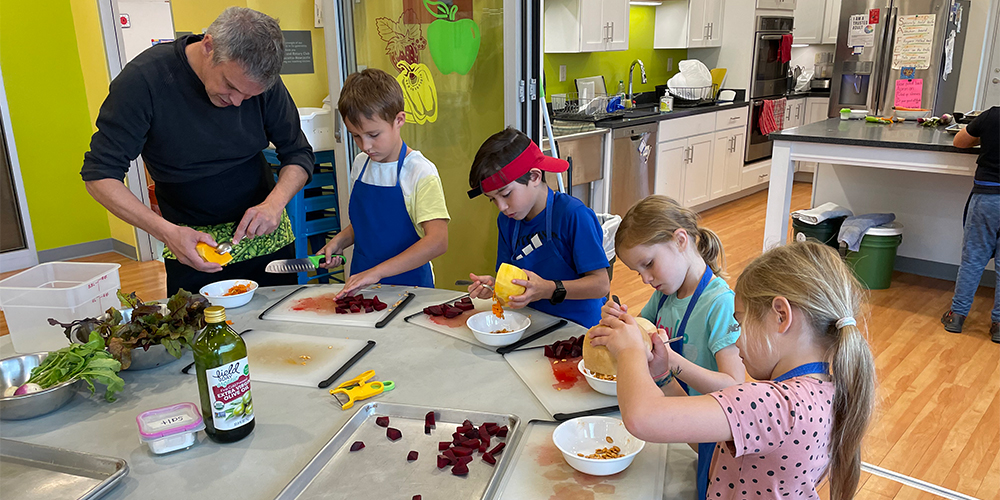To offer a vibrant, hands-on food education experience for the community, the Central Lincoln County YMCA formed FARMS at the Y. The program reaches across age groups and backgrounds in the community to provide a range of cooking classes, afterschool programs, summer camps, childcare enrichment and more.
FARMS at the Y first began as Focus on Agriculture in Rural Maine Schools (FARMS), a grassroots initiative led by passionate local parents and community partners determined to bring fresh, local vegetables into school lunches.
When initial efforts to change school meals faced logistical challenges, the group shifted its focus toward something just as powerful: food education. What the group discovered was transformative: when students grow, harvest, prepare and eat wholesome, nutritious foods, they develop a genuine appreciation for them. This connection encourages healthier eating habits and fosters curiosity, confidence and joy in the kitchen.
Leslie Wicks, the FARMS at the Y director at the Central Lincoln County YMCA, said to bring this vision to life and ensure long-term sustainability, FARMS became a permanent program of the YMCA, evolving into what is now FARMS at the Y.
“The program has blossomed since,” said Wicks. “We’ve stayed true to our mission and now serve over 1,000 students across nine area schools every year. By championing local, nutrient-dense food and empowering people to cook confidently, FARMS at the Y is not just promoting healthier lifestyles. We’re strengthening our local economy and building a more resilient, food-literate community.”
Program Activities
FARMS at the Y offers a vibrant experience that reaches across age groups and backgrounds. From childcare enrichment, birthday parties, adult wellness classes, food banks, farm cooking pop-ups and more, the Y brings food learning to every corner of the community.
Wicks said each class begins at the Y’s teaching kitchen where participants of all skill levels are greeted by an enthusiastic food educators. Then, classes kick off with an engaging demonstration on kitchen safety, food and knife skills, vegetable identification, and a preview of the day’s recipe. Also, classes are sure to spotlight Maine-grown, nutrient-dense foods to connect participants to the local food system.
“For school groups, our lessons often align with classroom curriculum like culinary explorations of global cultures, math skills through recipe measurements or hands-on history with traditional dishes,” said Wicks. “Our adult classes focus on integrating more vegetables into everyday meals in creative, approachable ways.”
Partnerships with local farms, gleaners, foodbanks and the farmers market have been essential to the success of FARMS at the Y. Wicks said the team is incredibly grateful to receive generous donations which allow them to offer local ingredients in every class.
“These relationships provide us with beautiful produce and help deepen our students’ connection to where their food comes from,” said Wicks. “Through our partnership with Twin Village Foodbank Farm, students have the unique opportunity to visit, farm and cook on-site. We also bring students to the Damariscotta Farmers Market where they can meet farmers, ask questions, sample local food and cook with what they’ve purchased.

Benefits for Participants and the Central Lincoln County YMCA
The benefits of participating in FARMS at the Y go beyond learning how to cook. Wicks said children leave the kitchen feeling empowered, inspired and proud. “We’ve heard countless stories from teachers, caretakers and parents about young participants asking for specific vegetables at the grocery store, eager to recreate the recipes they made in our kitchen,” she added. “That kind of excitement about healthy food is exactly what we strive for.
Thanks to the Y’s generous donors and fundraising efforts, the team provides monthly cooking classes to all local third grade students.
“Again and again, students who were once hesitant to try a new vegetable end up asking for seconds and bringing that enthusiasm home to their families,” said Wicks. “Whether we’re teaching kids how to safely chop kale or helping adults discover a new favorite vegetable, our teaching kitchen is a place where learning is joyful, skills are built with confidence, and every participant leaves feeling empowered.”
While the initiative continues to navigate the challenges of funding a growing program, the integration into the YMCA allowed FARMS to expand its reach and deepen its impact.
Specifically, the teaching kitchen is a welcoming space where the aroma of home-cooked food draw in curious members daily. That visibility and excitement is invaluable, and brings food education to life in a place where health and community are already top priorities.
“Our adult programming has flourished alongside our youth efforts,” said Wicks. “In fact, our Diabetes Prevention program celebrates its successes with a FARMS at the Y cooking session, blending education, empowerment and joy into a single shared experience. Being a permanent fixture at the Y has enabled us to connect with more families, spark curiosity across generations and support the YMCA’s mission of enriching lives.”
Lasting Advice
For Wicks, leading the initiative has been one of the most meaningful and rewarding experiences of her life. As the program transitioned to the YMCA and grew, she eventually stepped into the role of director.
“I’m honored to lead a small, but mighty team that includes two incredible food educators — Karen Kleinkopf and Lorna Fake — a handful of cross-trained staff from other departments and a dedicated crew of volunteers,” said Wicks. “Every day I get to collaborate with passionate, creative and compassionate individuals who believe in the mission as deeply as I do.
For other industry leaders looking to add similar, impactful programming, Wicks said to look to your community. This is because FARMS at the Y didn’t grow in isolation. The program’s evolution is deeply rooted in listening to local needs, building authentic partnerships, and working hand-in-hand with local entities and organizations.
If this specific program is appealing to you as a rec center leader, Wicks advised to first start small with food education.
“You don’t need a fancy kitchen or big budget to begin. A single class, demo or taste test can spark excitement and open the door to something bigger,” said Wicks. “Focus on connection, curiosity and community. Let the program grow from there. Finally, our doors are always open. We love welcoming visitors to the YMCA and sharing out story. If you’re passionate about bringing food education into your rec center, we’re always happy to talk, share ideas and cheer you on.”










